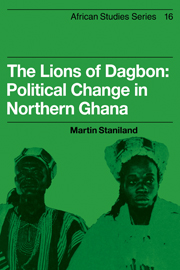Book contents
- Frontmatter
- Contents
- List of maps, figures, and tables
- Preface
- Abbreviations and glossary
- Map 1 Northern Ghana, 1965
- 1 The country and the people
- 2 Dagbon
- 3 Colonial rule, 1899–1930
- 4 Dagomba divided and united, 1899–1930
- 5 The battle of Watherston Road
- 6 Dagomba politics under indirect rule, 1932–1947
- 7 Votibu
- 8 Party politics
- 9 The Yendi tragedy
- 10 Conclusions
- Appendixes
- Notes
- Bibliography
- Index
8 - Party politics
Published online by Cambridge University Press: 04 August 2010
- Frontmatter
- Contents
- List of maps, figures, and tables
- Preface
- Abbreviations and glossary
- Map 1 Northern Ghana, 1965
- 1 The country and the people
- 2 Dagbon
- 3 Colonial rule, 1899–1930
- 4 Dagomba divided and united, 1899–1930
- 5 The battle of Watherston Road
- 6 Dagomba politics under indirect rule, 1932–1947
- 7 Votibu
- 8 Party politics
- 9 The Yendi tragedy
- 10 Conclusions
- Appendixes
- Notes
- Bibliography
- Index
Summary
If you make friends with a monkey, you will follow him into the tree.
The year 1948 was a watershed in Dagomba and Ghanaian politics. It was the year in which a major reform occurred in the political structure of the Dagomba kingdom and that in which, through the accession of another Abudu gate Ya-Na, the prospects of the Andani gate began to seem in jeopardy. It was also the year in which Nkrumah and his followers began their rapid rise to power.
In Dagomba history the twenty years which followed can be seen as a distinct period, a period characterised by a developing conflict over particular issues and a period having its own dramatis personae. In national terms, it was the period in which the Gold Coast became independent and in which Nkrumah's one-party regime rose and fell.
Taking national and local politics together, it is possible to discern three quite self-contained phases between 1948 and 1968. The first opened with the death of Na Mahama III in 1953 and closed in August 1960. It saw the accession of yet another Abudu gate paramount, the launching of a lengthy campaign to have him deposed, and the imposition, in August 1960, of a settlement by Dr Nkrumah and the C.P.P. government.
The second phase lasted from 1960 until the overthrow of the Nkrumah government in February 1966. Nationally, it was a period of one-party government, under which the formula imposed on Dagomba in 1960 was maintained, with the acquiescence, if not the support, of both sides of the royal family.
- Type
- Chapter
- Information
- The Lions of DagbonPolitical Change in Northern Ghana, pp. 133 - 147Publisher: Cambridge University PressPrint publication year: 1975

